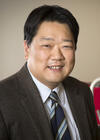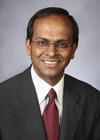In The News: Howard R. Hughes College of Engineering
Soft robots have become an area of interest due to the fact that they would make possible tasks and environments previously unachievable by traditional and rigid robotic systems. For example, soft robots could get around in rough terrain or engage in more physical contact with the human body.

Every January, the modern-day Masters of the Universe flock to the Strip. From Wall Street and Silicon Valley they come for CES, where the Fetty Waps of the world play Google after-parties, and heavyweights from Intel to IBM showcase the future’s infrastructure. It’s the biggest trade show in a city of trade shows.
Thanks to the use of an electroactive polymer, the material could make prostheses much more flexible and can even be handled by external electronic means.

Making sense of big data is often likened to finding a needle in a haystack. But a dean at UNLV’s engineering college says he’s improved the analogy. Organizing big data is more like finding one-tenth of a needle in a haystack, argues Rama Venkat, head of the Howard R. Hughes College of Engineering. “(And) there are not enough scientists to figure out what is in it,” he said.
Forget steel and aluminum. The robots of tomorrow may be able to squish, stretch and squeeze.
These days, whenever a group of roboticists gets together to talk shop, the subject almost inevitably turns to Google and its secretive robotics division. What are those guys up to?

Robots people the landscape of our sci-fi fantasies. Egg-shaped and beeping, golden humanoids with bad joints, and fully functioning (if pasty looking) androids.

In an off-campus building less than a mile away from UNLV, HUBO — a robot named Metal Rebel — stands still waiting for commands.

North Las Vegas could become the “breadbasket” of the valley, the city’s mayor has said.

UNLV student Kyle Kimsey recently won the regional qualifying round of the Global Student Entrepreneur Awards for his startup business Adler Dynamics.

Seeking to benefit from the anticipated, widespread commercial use of the unmanned aerial vehicle (UAV) nationwide, Nevadans have been working diligently to cultivate an industry around this type of aircraft.

Five Southern Nevada residents, including a financial expert, the general manager of the Regional Transportation Commission and an engineering professor, have been named to the new Nevada High-Speed Rail Authority.




